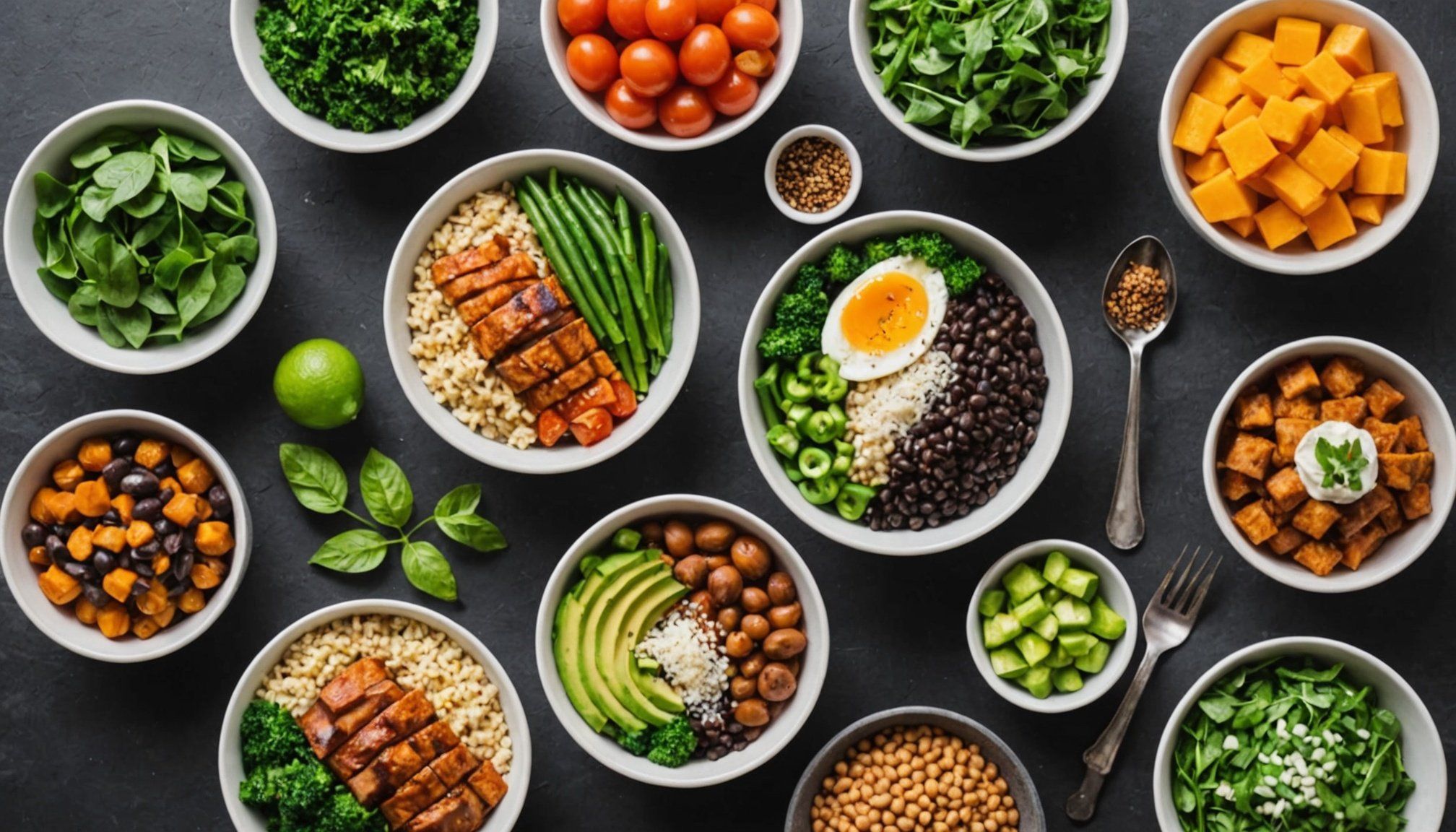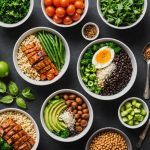Understanding Vegan Nutrition for Athletes
Vegan nutrition for athletes is a critical factor that directly affects their athlete diet and overall plant-based performance. Understanding its principles is key to enhancing endurance and strength. Vegan diets focus on a wide array of plant-based foods, providing essential nutrients without animal products. Achieving optimal performance requires careful planning to ensure an adequate intake of macronutrients and micronutrients.
Macronutrients, including carbohydrates, proteins, and fats, are the cornerstone of a vegan athlete’s diet. Carbohydrates serve as the primary energy source, while protein is crucial for muscle repair and growth. Sources like lentils, quinoa, and tofu are invaluable for this. Contrary to common beliefs, plant-based diets can sufficiently meet protein needs. Fats, found in nuts and seeds, help maintain energy levels and hormonal balance, supporting athletic demands.
Topic to read : Yoga for athletes: tailored routines to accelerate hamstring injury recovery
Micronutrients such as vitamins and minerals also play an indispensable role. Vitamin B12, D, iron, calcium, and zinc are particularly important to prevent deficiencies that could undermine performance and health. Plant-based foods rich in these include fortified cereals, leafy greens, and legumes.
Dispel misconceptions: a well-planned vegan diet can support rigorous training and successful athletic performance. With knowledge and strategic planning, athletes can unlock the full potential of plant-based nutrition, ensuring that each bite propels them toward their fitness goals.
Have you seen this : Enhance your ice hockey goalie”s peripheral vision: must-try drills for improved performance
Key Nutrients for Vegan Athletes
For vegan athletes, understanding and incorporating essential nutrients is vital in meeting their specific dietary requirements. Plant-based proteins serve as the foundational blocks, pivotal for muscle repair and growth. By focusing on both complete and complementary proteins, vegan athletes can meet their unique needs. Sources like chickpeas, black beans, and quinoa are rich in essential amino acids, which are critical for muscle recovery and maintenance.
Proteins and Amino Acids
A crucial aspect of plant-based protein consumption is ensuring the intake of complete proteins, which contain all nine essential amino acids. While animal products naturally contain complete proteins, vegan athletes can achieve this by combining foods like rice and beans or hummus and whole-grain bread. This strategic combination helps to overcome the limitation of individual plant foods lacking certain amino acids.
Vitamins and Minerals
For optimal health and performance, attention must be given to acquiring key vitamins and minerals. Vitamin B12 is often supplemented, as it is primarily found in animal products. Similarly, iron is available in plant-based sources such as spinach and lentils but is better absorbed when paired with vitamin C-rich foods. Iron is particularly important for maintaining energy and preventing fatigue.
Performance-Enhancing Foods
Vegan athletes can benefit significantly from integrating superfoods into their diet, boosting vegan performance through nutrient-rich choices. These foods, recognised for their high concentration of vitamins, minerals, and antioxidants, can enhance workout results and recovery.
Whole foods play a crucial role in elevating athletic performance. Foods like kale, spinach, and berries offer potent antioxidant properties, which may help reduce oxidative stress caused by intense workouts. Additionally, beetroot and pomegranate juice are known for their ability to improve endurance by increasing nitric oxide levels, thereby enhancing blood flow.
Incorporate functional foods into daily meals to maximise benefits. These include spirulina for its high protein content and turmeric for anti-inflammatory effects due to curcumin. Chia seeds and hemp seeds, high in omega-3 fatty acids, support recovery and reduce inflammation.
To successfully integrate these foods, focus on variety and balance. Mix different superfoods into smoothies, salads, or energy bars. Experimenting with diverse recipes ensures that athletes receive comprehensive nutrition, fuelling their bodies optimally for rigorous training. By leveraging the power of nutrient-rich foods, vegan athletes can achieve superior performance while maintaining a sustainable, ethical diet.
Meal Planning Strategies
Effective meal planning is essential for athletes committed to a vegan nutrition strategy. Understanding how to build balanced meals ensures that vegan athletes meet their unique dietary requirements for optimal performance.
Building Balanced Meals
Start by incorporating varied sources of macronutrients to create a nutritious meal. A balanced vegan meal plan for athletes should include a combination of carbohydrates, proteins, and fats. Such meals might consist of quinoa, black beans, and avocados to ensure a diverse intake. These components provide the necessary energy and nutrients for training and recovery.
Scheduling Meals and Snacks
The timing of meals and snacks is crucial to maximise vegan performance. Align meals around workouts, with carbohydrates and proteins featured in post-workout nutrition for muscle repair and replenishment. Snacks, like nut butter with fruit or protein-rich smoothies, can sustain energy levels throughout the day, ensuring athletes remain fuelled and ready.
Sample Meal Plans
Daily meal plans should consider a variety of nutrient-dense foods to support sustained performance. For instance, breakfast might include oatmeal with chia seeds and berries, while lunch offers a chickpea salad. Embracing seasonality in produce can add variety. Regular experimentation with vegan recipes can help athletes maintain enthusiasm for their dietary regime while staying nutritionally balanced.
Overcoming Challenges of Vegan Athletic Nutrition
Navigating the world of athletic nutrition can present unique challenges for those following a vegan approach. Dietary obstacles need careful consideration to ensure athletes receive the necessary fuel for peak performance.
Addressing Nutritional Deficiencies
Vegan athletes often face risks of deficiencies in nutrients like Vitamin B12, iron, and omega-3 fatty acids, which are pivotal for energy and recovery. Combat these shortcomings with supplementation tailored to individual needs, ensuring all essential nutrients are adequately met. Regular health assessments can preemptively identify gaps in nutrition, allowing timely adjustments.
Social and Cultural Considerations
Vegan athletes face hurdles in social settings, often needing to articulate their dietary choices clearly. Dining out can be particularly challenging; thus, planning and communicating with restaurants in advance becomes essential. Moreover, openly discussing dietary needs with coaches and teammates fosters understanding and support.
Psychological Aspects of Veganism in Sports
The transition to veganism involves a significant mental shift, which can affect athletes’ performance mindset. Understanding these psychological changes helps in overcoming stigma and misconceptions prevalent in sports communities. Building mental resilience ensures athletes maintain their dietary choices during competitions, fostering a balanced and sustainable athletic journey.
Making informed decisions and garnering support enables vegan athletes to thrive without compromising their dietary principled.











